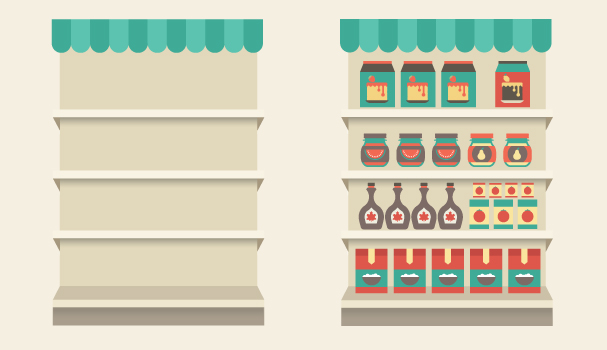Every week, supermarkets across the UK are teeming with new products and small companies are taking up more shelf space than ever before. Big players like Selfridges and Sainsbury’s are tough nuts to crack, and although the rewards are great, not every company makes the cut. So how do you know if now is the right time for your product to make the gambit?
Brighton is often referred to as Britain’s hippest city and Lick, the frozen yogurt firm, is only adding to the cool. Not just purveyors of dairy deserts, founders Ky Wright and Owain Williams also host yoga lessons and run a record label under the Lick brand. But don’t be fooled: while Lick is a hugely popular treat among indie types on the south coast, it also has an increasingly large presence in major supermarkets up and down the country, including Sainsbury’s and Waitrose.
However, when the pair approached Whole Foods they weren’t 100% sure if they were ready for the shelf as they had never done anything like it up until that point. What Williams can say with certainty was that having outsourced production, Lick was more than able to meet the demand of the major retailers. Like a lot of small brands, Lick built up a dedicated small following and so Williams knew the potential was high. “We also had so much faith in the brand that we knew people would go for it, we just needed to get it out there,” he says.
In terms of quality, taste and texture the product was good to go. After stocking at Whole Foods, Lick found its way to Ocado, and in 2013 it got its first listings in Sainsbury’s Local. But timing was key. “We’re glad we didn’t approach supermarkets a year earlier because we would have struggled; we were still learning,” says Williams.
Major retail chains are always happy to deal with smaller businesses that not only have a good product and can compete on price with the big guys, but have an interesting story to boot. And stories don’t come much more interesting in the food isle than our former One to watch, Jimmy’s Iced Coffee. Having fled the UK for Oz following something of an existential crisis, founder Jim Cregan fell in love with an iced coffee and upon his return to Blighty realised that it didn’t exist in any real capacity here, so he set about creating his own.
“Before approaching a supermarket you have to find a gap in the market and create a product that’s better than anything else. Until then you’re not ready.” During his colourful presentation to Selfridges, the high-end department store managers could not only see he had tenacity, but that he had a long-term goal. “We didn’t just swan in there going, ‘I’ve got a great idea for a frozen coffee company’; they could see we had a great product and were focused and realistic.”
Shelf-life begins with taking a risk. “The key to success with supermarkets is being very real in what you’re doing and realising that supermarkets are really big businesses that can drastically affect what you’re doing and can make your life a lot better or a lot worse, depending on how ready you are,” say Cregan.
On the flip side, some companies are happy to go it alone. Good and Proper Tea, for example, is a London-based loose-leaf brew bar on a mission to get our capital drinking better tea. Operations consist of sourcing teas from around the world and custom brewing them from various locations around London. It also sells all the makings for the perfect cup from its website.
Although Good and Proper recently started supplying teas to a handful of handpicked independent outlets, it doesn’t take a reading of the tea leaves to work out that supplying to big retailers is out of the question for now. “First of all, it comes down to size and manpower,” says founder Emilie Holmes. “We only took someone on full-time in November when we launched our wholesale business and operations remain small.”
“We don’t have a passionate anti-supermarket stance; for us it’s more about what’s right for our product,” Holmes says. “The level of education and understanding of tea is low, so putting high-quality tea on the shelves is something that we know doesn’t work; it would be too much of a jump.”
Luxury items are tricky to sell in supermarkets when there isn’t much awareness around them. With coffee, for example, Starbucks came along and showed everyone that coffee can be so much more than instant. With tea, this hasn’t happened yet and so remaining close to the customer base for now is a good way for Holmes to educate her customers.
“Right now, in order to work with supermarkets, Good and Proper would also need a lot of support and promotion, which would change its distribution quite heavily,” says Holmes. “We would need an entire team to manage that side of the business and right now we just don’t have the scale.”
Selling to big retail chains is clearly not the right route for everyone. When launching a new product, companies undoubtedly have a list of things they need to focus their resources on. One thing’s for certain: if you have your eye on supermarket shelves, you have your work cut out for you. ![]()
Share via:








































